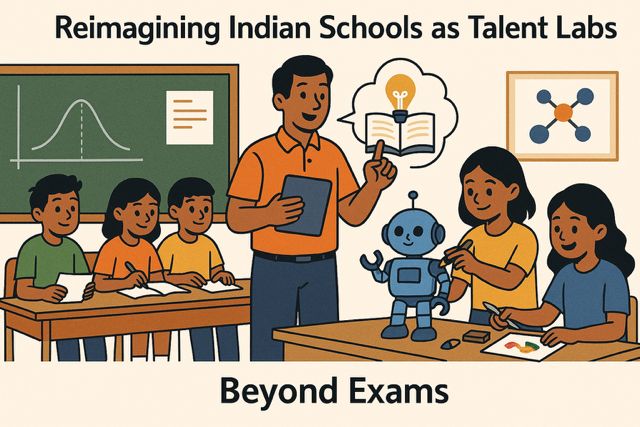By: Siddharth Anand, Founder and CEO, Tertiary Education Advisors
Imagine walking into a school not haunted by rigid exam schedules and rote recitations, but humming with the buzz of curiosity: students experimenting, failing, getting coached, innovating, collaborating. What if our schools were designed primarily as talent labs, incubators of potential, rather than exam halls where conformity is measured in test scores?
In India, this question is not theoretical. It is urgent. Our demographic dividend, the world’s largest youth population, will either be a blessing or a burden depending on whether our schools nurture talent and purpose or merely churn out exam-takers.
Why the Exam Hall Model is Insufficient
The exam-centric model has a strong grip on Indian schooling. Board exams, competitive tests like JEE, NEET, CUET, and endless coaching classes create a system where memorization and speed often overshadow creativity and curiosity. This has produced globally admired “Indian talent” in STEM and medicine, but at a huge cost:
Narrow pathways: Students with gifts in arts, design, sports, or social leadership often find themselves marginalized.
Stress epidemic: India has one of the highest rates of student stress and exam-related anxiety.
Inequity: Access to coaching, not talent alone, often decides opportunity. We cannot deny that exams matter. But if schools remain merely exam halls, we are preparing children for a past that no longer exists.
What a Talent Lab School in India Could Look Like
If we reimagined Indian schools as talent labs, here are the features we could prioritize:
Exploratory Curriculum Beyond Exams: Every school day must carve out space for exploration. A school could let students spend mornings on core academics but afternoons on projects, clubs, internships, community service, or independent study. The NEP 2020 already advocates multidisciplinary learning, and implementation must push it into daily timetables.
Sports as a Non-Negotiable Foundation: Sport is not just play. It is one of the strongest training grounds for discipline, resilience, leadership, teamwork, and delayed gratification, qualities that every talent lab needs to instill. Countries like the U.S. mandate high school athletics not to produce Olympians, but to shape character. In India, we have initiatives like Khelo India, but they must be integrated into the academic timetable, not treated as extracurricular. Imagine if participation in at least one sport were as mandatory as math. Every student, irrespective of background, would build physical literacy and the athlete’s mindset, transferable to entrepreneurship, research, and leadership.
Portfolio-Based Assessments: Instead of judging children solely based on board exam marks, we can build digital portfolios showcasing projects, performances, competitions, and reflections. A student who designs a water filter for her village or captains a kabaddi team should have that achievement count as much as topping a physics paper.
Maker Spaces and Innovation Labs: The Atal Tinkering Labs under NITI Aayog are an excellent starting point. But we need to democratize such spaces: every school, whether rural or urban, should have access to simple makerspaces. A room with 3D printers is great, but even recycled material, carpentry kits, and coding tools can turn imagination into innovation.
Teacher as Coach, Not Just Examiner: Teacher training in India often lags behind. If schools are to be talent labs, teachers must be retrained to be coaches and mentors: spotting potential, giving constructive feedback, and guiding exploration. States like Kerala and Delhi have piloted teacher innovation programs, and these must scale nationally.
Integration with Local Communities: Talent is contextual. Rural schools can partner with local artisans, farmers, or athletes to bring real-world knowledge into classrooms. Urban schools can link with start-ups, NGOs, or universities. This not only builds skills but also roots students in their communities.
Why Sports Should Be the Bedrock
If there is one pillar without which no talent lab can stand, it is sport. Sport teaches what textbooks cannot:
Resilience in failure: losing a match teaches how to bounce back.
Teamwork and leadership: every sport involves roles, strategy, cooperation.
Time management and discipline: balancing practice and academics builds habits for life.
Healthy competition: striving to win without demonizing the opponent.
When we see schools that mandate sport, we see confident, healthier, more balanced students. In India, the irony is that sport is often sacrificed during board years, exactly when students need its lessons most.
If India were to declare sports participation non-negotiable in every school, with funding, infrastructure, and trained coaches, we would take a giant step toward turning schools into true talent labs.
Implementation Pathways in India
The shift from exam halls to talent labs will need systemic reform. Some practical steps:
Policy Reform: Boards like CBSE and ICSE should recognize portfolios and projects as part of final grades. Sports achievements, community service, and entrepreneurial ventures must carry academic credit.
Public–Private Partnerships: India’s EdTech boom offers tools for labs: virtual science experiments, AI-driven learning paths, digital portfolio builders. Collaboration between government schools and start-ups can democratize access.
Pilot Talent Lab Districts: Choose one district in each state to implement the full model: daily sports, makerspaces, project-based learning, and portfolio assessments. Measure outcomes in creativity, health, employability, and student well-being.
Sports Infrastructure Mandate: Every new school approval should require basic sports facilities such as a ground, indoor space, and coaches. For existing schools, government schemes like Samagra Shiksha can prioritize upgrades.
Teacher Empowerment: India must invest in ongoing professional development. If Finland can make teaching one of the most prestigious jobs by empowering teachers as innovators, India can too.
The Bigger Picture: India’s youth need more than grades. They need self-belief, adaptability, creativity, and resilience. Exam halls do not provide this. Talent labs do.
The benefits are not abstract. Consider these ripple effects:
Employability: Graduates ready for industries that prize problem-solving over rote.
Health and well-being: Reduced stress, stronger bodies and minds.
Equity: A child from a village with athletic ability gets as much recognition as one from an elite urban school with test prep.
National growth: More innovators, more leaders, more citizens confident to solve problems.
Conclusion
If we truly want to prepare India’s youth for the future, we must reimagine schools as talent labs, not exam halls. That means embedding exploration into the curriculum, mandating sports as a non-negotiable foundation, recognizing diverse achievements, and equipping teachers as coaches.
It will not be easy. It will take courage from educators, risk-taking from policy makers, and open-mindedness from parents. But the alternative, a generation trained only to clear exams, is too costly.
The question is not whether we can afford to build talent labs. The question is whether we can afford not to.



